By Lucy Komisar
March 4, 2008
In 1986 I went to Prague to report on the dissident movement. Among the leaders I wanted to see was Jiri Dienstbier, who had been a reform Communist and radio journalist and commentator during the 1968 “Prague Spring.” He’d lost his job, because he spoke out on the air against the Soviet military intervention. After he helped found the human rights group, Charter 77, he‘d spent three years in prison and then worked as a boiler technician in the subway.
He had been hard to reach. The phone company the month before had informed him half-apologetically that the city needed his line “in the public interest.” I left a note under his door, and he phoned that evening, asking if I wanted to go to an outdoor rock concert. We spent the next afternoon in the surreal setting of a sculptor‘s rock quarry that had been lent to a dissident jazz club.
It all came back to me when I saw Tom Stoppard‘s “Rock ˜N‘ Roll,” on Broadway, directed by Trevor Nunn, about Czech dissidents and the government officials who repressed them. (Both Stoppard and Nunn are British.)
Stoppard, a man of the Left, muses over the decisions people make when confronted with tough personal and political choices. Mixing the complexities of peoples’ lives with their political realities, he paints figures who exhibit varying combinations of morality, courage and weakness.
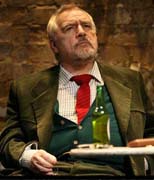 Max Morrow (Brian Cox), the unreconstructed Stalinist Cambridge professor, sides with the Soviets against the 1968 uprising led by the reformist Communist, Alexander Dubcek. He says, I’m like the last white rhino and argues with his Czech student Jan (Rufus Sewell) about the meaning of freedom. Max says that in London “everyone‘s free to have lunch at the Ritz, and it‘s absolutely legal to be unemployed…. For you freedom means leave me alone. For the masses it means give me a chance. Jan ripostes, Stalin killed more Russians than Hitler.
Max Morrow (Brian Cox), the unreconstructed Stalinist Cambridge professor, sides with the Soviets against the 1968 uprising led by the reformist Communist, Alexander Dubcek. He says, I’m like the last white rhino and argues with his Czech student Jan (Rufus Sewell) about the meaning of freedom. Max says that in London “everyone‘s free to have lunch at the Ritz, and it‘s absolutely legal to be unemployed…. For you freedom means leave me alone. For the masses it means give me a chance. Jan ripostes, Stalin killed more Russians than Hitler.
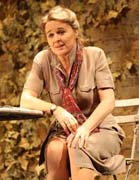 But Max also provides little human support to his cancer-stricken wife, Eleanor (Sinead Cusack) who shows courage while Max has affairs. So much for loving man or woman as well as mankind. Eleanor displays more personal fortitude dealing with her disease than Max does in refusing to share her suffering.
But Max also provides little human support to his cancer-stricken wife, Eleanor (Sinead Cusack) who shows courage while Max has affairs. So much for loving man or woman as well as mankind. Eleanor displays more personal fortitude dealing with her disease than Max does in refusing to share her suffering.
Jan is about to find out just how relentless Stalinist repression is. He has a history that ought to make him understand. He is Jewish, a journalist and university lecturer. He left Germany with his mother before Hitler and spent the war in England. Jan‘s father died in the war, and he returned home in ˜48 with his mother. It is not immediately explained how he managed to get back to England, under Communism in the sixties, to attend Cambridge University. When he goes back to Prague in 1968 “to save rock and roll” and his mother, he is told by Czech officials that his luggage includes socially negative music.
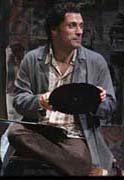 Throughout, Jan‘s demeanor is increasingly tentative, nervous, fearful. A university lecturer and journalist after ˜68, he compromises his newspaper articles and agrees not to be “rude” to the Russians, insisting, We’re still in charge of creating socialism with a human face.
Throughout, Jan‘s demeanor is increasingly tentative, nervous, fearful. A university lecturer and journalist after ˜68, he compromises his newspaper articles and agrees not to be “rude” to the Russians, insisting, We’re still in charge of creating socialism with a human face.
But he refuses to sign a loyalty pledge and is purged along with 900 university professors and half the journalists. He notes ruefully, Self-censorship about Soviets didn‘t save us.
At first, he rejects the importuning of his activist friend Ferdinand (Stephen Kunken) to join the opposition. Heroism isn‘t honest work, he declares. Yet, he is inexorably pulled in, because he is a fanatic rock music fan, and the government has targeted rock groups.
He says, “Underground concerts are so rare now (1974), kids from all over the country got the word and found their way to this nowhere place. So did busloads of police, with dogs. They stopped the concert and herded everyone to the railway station and through a tunnel under the tracks, and in the tunnel the police laid into everybody with truncheons. Rock ‘n‘ roll!”
The unseen star of the play is the Plastic People of the Universe, a rock group that became a target of the government not just because its venues became meeting places for the dissidents – like the quarry concert I attended – but probably because government officials didn’t understand the idiom and thought it must be subversive.
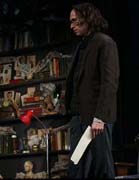 Ferdinand has no interest in them, because he sees no political “leverage” there. He says, “Who‘s going to change things for the rest? Not the ones who just want to be left alone.” He wonders, “Who‘s got the best chance of getting [Czech President] Husak‘s attention – [Playwright Vaclav] Havel or the Plastic People of the Universe?” Jan replies, “The Plastics.”
Ferdinand has no interest in them, because he sees no political “leverage” there. He says, “Who‘s going to change things for the rest? Not the ones who just want to be left alone.” He wonders, “Who‘s got the best chance of getting [Czech President] Husak‘s attention – [Playwright Vaclav] Havel or the Plastic People of the Universe?” Jan replies, “The Plastics.”
Havel also understood the significance of the repression of rock musicians. He defended The Plastics, and that led to Havel’s open letter to Husak and to the human rights document Charter 77, which Havel, Dienstbier and others organized and which with more than a hundred signatures, flowered into a dissident movement. Jan signs after internal conflict. He and his cohorts end up like Dienstbier. Stoppard‘s Jan works in a bakery for 12 years!
There will be a few surprises, and contradictions, including the irony of Jan getting permission for his Cambridge studies by agreeing to inform on Max – his mentor and a loyal Communist — to the Czech police. Of course, he tells them pap. And in 1977, Max supplies some unknown documents to the Czech secret police to buy freedom for Jan, then in prison.
Stoppard takes us up to the fall of the system. In 1987 Gorbachev announces perestroika (reconstruction) and greater ˜control from below‘. Journalists are lining up to interview Havel. But the Czech leadership refuses to publish Soviet leader Gorbachev‘s perestroika speech, although Soviet TV is available in Czechoslovakia. Police arrest people who go to “The John Lennon Wall” to light candles and play his music. But after the Berlin Wall falls in November 89, the Czech Communist leadership disintegrates and resigns.
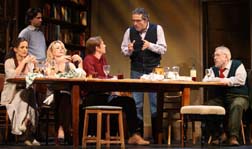 They will dispute the significance of what they lived through. In Czechoslovakia, the cultural revolution provoked by rock contributed to political upheaval. Not so in the West. In ‘68 in the West, as a British journalist in the play puts it, “We were all high on bringing down capitalism… And ending war. All war, not just Vietnam.”
They will dispute the significance of what they lived through. In Czechoslovakia, the cultural revolution provoked by rock contributed to political upheaval. Not so in the West. In ‘68 in the West, as a British journalist in the play puts it, “We were all high on bringing down capitalism… And ending war. All war, not just Vietnam.”
Max declares, “It turned out to be merely a cultural revolution. It left the system in place…” And Stephen (Brian Avers), the boyfriend of Max‘s granddaughter, comments, “Capitalism doesn‘t self destruct, it adapts.”
Perhaps Stoppard wants us to understand that in some ways, in some places, the cultural revolution is a political revolution. As the Czech Lenka (Nicole Ansari), Max‘s lover, says, “Make love, not war” was more important than “Workers of the world unite.” When communism fell, Jiri Dienstbier became the free country’s foreign minister.
“Rock ˜N‘ Roll.” By Tom Stoppard. Directed by Trevor Nunn. Starring Brian Cox, Sinead Cusack, Rufus Sewell, Nicole Ansari, Brian Avers, Mary Bacon, Alice Eve, Seth Fisher, Stephen Kunken, Quentin Mare, Ken Marks, Alexandra Neil, Anna O’Donoghue. Sets by Robert Jones, Costumes by Emma Ryott.
Jacobs Theatre, 242 West 45th Street. Tue – Sat at 8pm; Wed & Sat at 2pm; Sun at 3pm. Running Time: 2 hours, 40 minutes. $76.50 – $98.50. 212-239-6200. http://www.rocknrolltheplay.com/.
Photos by Joan Marcus.

